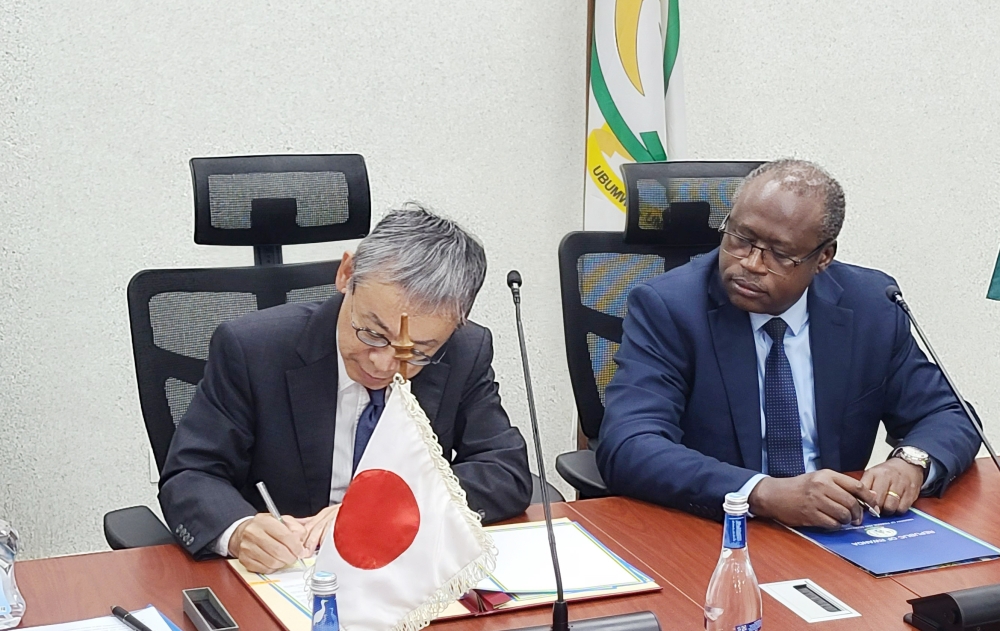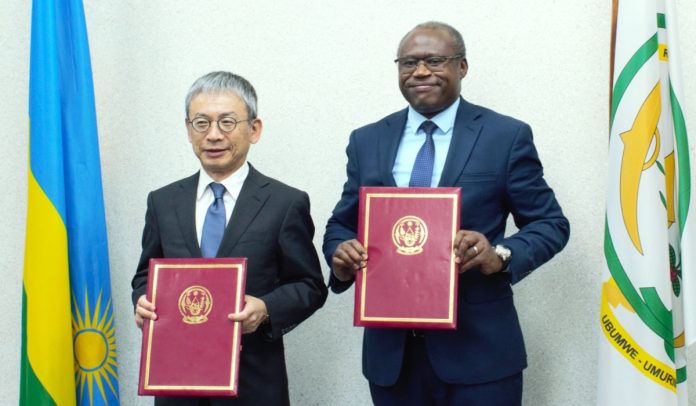Rwanda and Japan have signed a grant agreement worth $14.6 million to establish a new transport control system aimed to reduce traffic congestion and improve mobility in Kigali.
The agreement was signed between the Minister of Finance and Economic Planning, Uzziel Ndagijimana, Ambassador of Japan to Rwanda, Isao Fukushima, and Minako Shiotsuka, Chief Representative of Japan International Cooperation Agency (JICA), on October 5.
Dubbed “Intelligent Transport System”, the project consists of developing a traffic control system and signal control system together with intersection improvements, which will be centred in the City of Kigali and Rwanda National Police Traffic Department.

This new project comes at a time when Kigali is mulling strategies to address the pertinent issues in the transport sector including traffic congestion at peak hours that affects both public and private transport, and lack of enough public buses, among others.
In addition to the Dedicated Bus Lane (DBL) system that will occupy two lanes of the CBD-Sonatubes-Giporoso road during peak hours (early morning and evening), this technology will allow the monitoring and real-time control of traffic flow across different parts of Kigali.
Ndagijimana said, “The intelligent transport system will be a game changer in terms of reducing congestion improving safety, mobility, convenience, and efficiency of transport within and through Kigali. An efficient and sustainable transport system is critical for accelerating trade, which benefits businesses and boosts the economy.”
Given that Rwanda is a land-linked country, Amb Fukushima said it has an integral role to play as the nodal point between the Central and Northern Corridor, as well as expedite the trade in the region and continent under The African Continental Free Trade Agreement (AfCFTA).
Pudence Rubingisa, Mayor of Kigali, said that this is yet an impetus in the target to transform the city using smart solutions to ease the way of living in Kigali with urban transportation as a top priority.
He added that there is a dedicated team at the City of Kigali in charge of the project and it has already conducted preliminary studies in collaboration with JICA to ensure timely implementation of this project.
Shiotsuka also noted that this project will deliver an inclusive, sustainable, and resilient city while promoting solidarity and empowering individuals.
“Urbanisation issues cannot be solved with a single project. We are strongly committed to the formulation of synergy among stakeholders in urban transportation,” she added.

How the technology works
According to officials, the project will use Moderato, a Japanese technology that involves the installation of signal lights at 20 selected junctions and traffic sensors connecting with the fibre network.
The sensors detect the traffic information in real-time which is sent to a traffic controller and transmitted to the centre at the City of Kigali which then calculates the optimum green time of each junction while synchronising the green time and cycle time of each phase based on traffic time on the field.
At the same, the information is sent to the RNP Traffic Department for further analysis in real time.
The technology calculates split and cycle length in consideration of road ratio and queue length of each direction. Split allows the required time to cross a junction to be equal, thus, ensuring a fair share of green time for each direction.
The works are expected to start in June 2024 and the project is anticipated to be completed in December 2026.
The project is aligned with ease of mobility and efficient transport in the fourth pillar of Urbanisations and Agglomeration in Vision 2050, aiming at economic growth and prosperity and high quality and standards of life for Rwandans.
Japan has been supporting the Government of Rwanda in the infrastructure sector through JICA, mainly developing the economic infrastructures such as a one-stop border post, road improvements, improvement of the Substations and Distribution Network, and in the water sector.


